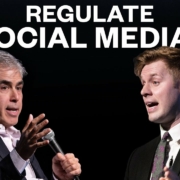Enlightenment and the Righteous Mind
They discuss:
- How cognitive biases lead to a more pessimistic view of the world [07:00]
- The problems with the idea of utopia and its beneficial uses when properly inserted into a society’s belief (religious) structure [10:30]
- Examining the role group religions play in bringing people together [18:00]
- The role Christianity had, according to Peterson, in turning people’s attention to the evil within us all [24:30]
- Engaging people toward a higher set of goals without religion as a backbone [29:30]
- Is the world we live in a new frontier based on the expanding influence of the internet and social media on individuals’ decision-making? [38:00]
- The dangers posed by the new world to the endurance of liberal democracies [48:00]
- Finding truth in the post-2012 social media revolution [56:00]
- The rate of change in modern life [1:06:00]
- Haidt’s interpretation of the religious instinct/impulse and why he gets a positive reaction from religious crowds [1:07:00]
- The human ability for imitation through learning or exploring [1:17:30]
- Religion as a social function or an inherent impulse inside us all to find higher states [1:25:30]
- Views on the central uniting principle of groups, societies, or human beings [1:29:30]
- Power as the central driving factor of western European civilization [1:33:00]
- Is having a common purpose or shared beliefs a more powerful way of bringing people together? [1:37:52]
Steven Pinker is the Johnstone Family Professor in the Department of Psychology at Harvard University. He conducts research on language, cognition, and social relations, writes for publications such as the New York Times, Time and The Atlantic, and is the author of twelve books, including The Language Instinct, How the Mind Works, The Blank Slate, The Stuff of Thought, The Better Angels of Our Nature,The Sense of Style, Enlightenment Now, and the forthcoming Rationality: What It Is, Why It Seems Scarce, Why It Matters.
Jonathan Haidt is a social psychologist at New York University’s Stern School of Business. Haidt’s research examines the intuitive foundations of morality, and how morality varies across cultures––including the cultures of progressive, conservatives, and libertarians. His goal is to help people understand each other, live, and work near each other, and even learn from each other despite their moral differences. Haidt has co-founded a variety of organizations and collaborations that apply moral and social psychology toward that end, including HeterodoxAcademy.org, OpenMindPlatform.org, and EthicalSystems.org.
Jordan B. Peterson is a professor of psychology at the University of Toronto, a clinical psychologist, and the author of the bestsellers Beyond Order: 12 More Rules for Life & 12 Rules for Life: An Antidote to Chaos, #1 for nonfiction in 2018 in the US, Canada, the UK, Australia, New Zealand, Sweden, the Netherlands, Brazil and Norway, and slated for translation into 50 languages.








